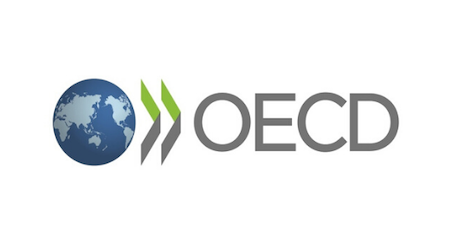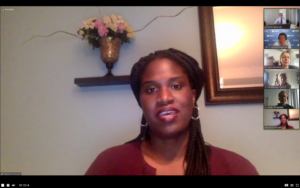Shifting the Conversation on Remedy: Reflections on the 2020 OECD Global Forum on Responsible Business Conduct

As the 20th anniversary of the OECD’s system of grievance mechanisms, known as National Contact Points (NCPs), coincides with COVID-19, there is a clear connection between ensuring access to remedy and achieving a more just, equitable world post-crisis. Many communities affected by corporate activity or international investments face heightened vulnerability to the pandemic and economic crisis precisely because of the harm they have experienced––making provision of remedy all the more vital to post-crisis recovery.
Ensuring effective remedy for communities was central to our remarks during the recent 2020 OECD Global Forum on Responsible Business Conduct, which was held in two parts and focused on how the COVID-19 crisis makes responsible business conduct all the more important, as well as the state of accountability and remedy today. Accountability Counsel’s Senior Policy Associate, Stephanie Amoako, shared the following reflections about changes needed to promote provision of remedy through non-judicial avenues while speaking on the forum’s opening panel about the remedy landscape today:
Non-judicial Accountability Offices are Often the Only Available Avenues for Justice for Business and Human Rights Violations
Around the world, we have seen the impact of business activities or internationally financed projects gone wrong, including damage to local water sources, labor violations, and displacement of vulnerable populations.

AC’s Stephanie Amoako speaking during the panel
In an ideal world, a community that has experienced such impacts could access a myriad of avenues for accountability, including the judicial system, and could receive meaningful remediation through any of the options available. Unfortunately, this is not the case. Several barriers exist for communities to even file a lawsuit against bad corporate actors, including laws that are often inadequate to protect people and the environment from corporate abuses, corruption in the judicial system, as well as the high costs of litigation, lengthy delays, and lack of access to adequate legal assistance.
Given this reality, independent non-judicial accountability offices are often the only available means of seeking accountability and remedy for harm. This includes the independent accountability offices found at international financial institutions (IFIs), which can address complaints through a dispute resolution process or a compliance review investigation, and the 49 NCPs, which can offer mediation between companies and complainants. We have seen the value of these accountability offices in our work with communities around the world, including historic victories in Haiti and Mongolia where promising dispute resolution agreements offer hope for the restoration of livelihoods after environmental and social harm.
Accountability Offices are not Perfect, and Significant Barriers Exist to Meaningful Remedy
Although non-judicial accountability offices are a valuable avenue for seeking accountability and remedy, there are still challenges with these bodies. Data from the Accountability Console shows that of the 1,262 complaints filed to IFI independent accountability offices over the past 25 plus years, only 217 have resulted in either a dispute resolution agreement or a compliance review report. This large drop-off is due, in part, to the accountability offices deciding that the complaints are not appropriate for dispute resolution or compliance review, despite the presence of serious allegations of abuse. Accountability offices must continue to improve their processes to be fairer and more predictable and accessible.
Even for the complaints that have resulted in a dispute resolution agreement or a compliance review report, we have seen challenges in making sure that, at the end of the day, the outcome of the accountability office process produces real action towards redress and remedy for communities. For example, despite a 2016 investigation report confirming labor abuses, poor sanitary and living conditions, and other violations, workers and their families on IFC-financed tea plantations in Assam, India are still waiting for remediation of these harms. Years of delayed remedy for these harms are now in sharp relief as the COVID-19 crisis threatens to further devastate these vulnerable communities. Similar challenges persist within the NCP system. OECD Watch’s 2015 analysis of 15 years of NCP data found that “only one percent of the 250 NCP complaints filed by communities, individuals and NGOs have resulted in an outcome that directly improved conditions for the victims of corporate misconduct.”
As Surya Deva, member of the UN Working Group on Business and Human Rights stated during the forum, we need to shift the conversation from providing access to effective remedy to the provision of actual remedy. At Accountability Counsel, we are working to do just that. We are pushing IFIs and their independent accountability offices, as well as the NCP system, to strengthen their complaint processes to make them more accessible, fair, and transparent and to address the barriers at the institutional level to providing remedy. One such barrier is the lack of resources, and we and our partners are calling on IFIs to create remedy funds to ensure that resources are available for meaningful remediation.
All Financial Actors Should Create Accountability Offices
Despite their challenges, independent accountability offices continue to be an important avenue for accountability and justice. Unfortunately, many financial actors lack these mechanisms, leaving communities affected by their financing without a real opportunity to raise grievances.
Not only does this gap harm affected communities, but institutions themselves are left without these important feedback channels that can reveal unintended consequences of an investment in a cost effective, timely fashion, as well as help avoid challenges with projects in the future.
Financial actors, including impact investors, private banks, and Chinese financial institutions, can take action to close this accountability gap now. Importantly, they have an opportunity to build upon the lessons learned from existing accountability offices, both positive and negative, and create offices that are accessible, effective, and deliver real remedy.
“Access to remedy is a core part of this protection and of any post-crisis recovery.”
– Angel Gurría, OECD Secretary General
Our New Reality Requires a Renewed Commitment to Remedy
In his remarks during the forum, OECD Secretary General, Angel Gurría, highlighted challenges posed by the COVID-19 crisis and reflected on the need to protect the most vulnerable in society. “Access to remedy is a core part of this protection and of any post-crisis recovery,” Gurría stated. Going forward, all actors, including companies, governments, and accountability offices, must address the barriers to effective justice and remedy to promote the more just, equitable world that this moment demands. At Accountability Counsel we are working to ensure that this happens. Follow the links to learn more about our advocacy towards IFI accountability offices and the OECD NCP system.

